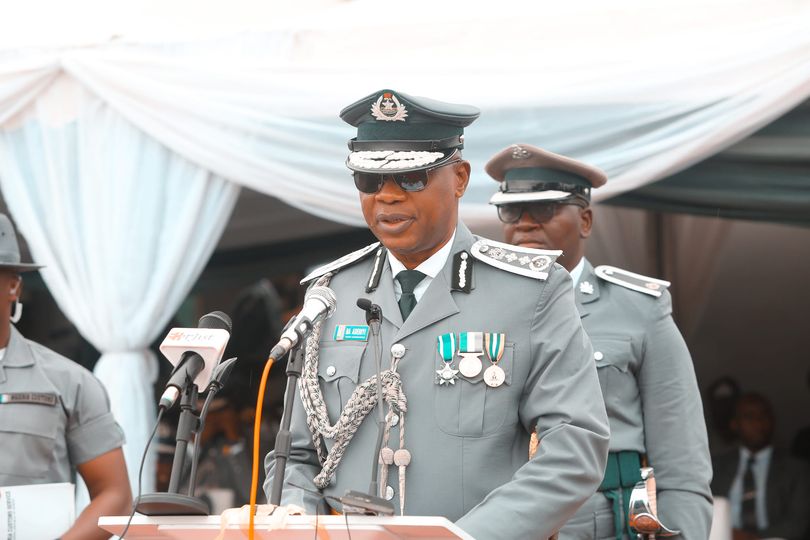
The Customs Comptroller General’s conference was introduced by the then-Customs Comptroller General, Alhaji Ahmed Aliyu Mustapha in 2000, as a way of taking stock of the out-going year and tasking its personnel for the in-coming year.
It was held successfully in various parts of the country before it was stopped in 2008, when it began to lose focus and the essence of its conception.
So, when Alhaji Hamman Bello Ahmed as the CG of Customs decided to scrap the annual event, it was a further vindication of our stand that the conference had turned out to be, was certainly not what Alhaji Ahmed Mustapha conceived and birthed.
In our editorial opinion shortly before it was stopped, we argued that the annual Customs Comptroller General’s conference had lost focus, stopped meeting its objectives and had become worse than a town hall meeting.
We slightly fell short of calling for its scrapping. We recall that after the editorial, we received calls from those who felt that our position was in bad taste. We were called names. But, a few weeks after the editorial, the then-CG of Customs Alhaji Hamman Bello Ahmed decided that the Service no longer needed the jamboree called CG Annual Conference
Before the suspension, the conference had been held in all the nation’s geopolitical zones. Cities like Port Harcourt, Kano, Ibadan, Yola, Owerri, Calabar, Jos, Otta and Sokoto have had the privilege of playing hosts to customs big wig.
We are sure that when the former Customs number one man initiated the conference, he9 thought he was creating a platform for top shots in the service to frankly appraise themselves within the context of the expected roles of the Nigeria Customs Service; as a revenue collector and a trade facilitator.
When the CG conference lasted, stakeholders from shipping to manufacturing, to port and border operations, including sister government agencies and security agencies converge on cities chosen by the Customs to proffer solutions to how best to help the customs do its work better.
The stakeholders’ forum, which was an integral part of the conference, became a veritable opportunity for all those who had grievances to let them out.
A good innovation the stakeholders’ forum was, but it later turned out worse than a town hall meeting where all spoke, but none acted.
Back to the present: When news filtered in, that the incumbent Customs CG; Mr Adewale Bashir Adeniyi was planning to reintroduce the annual event, we were a bit apprehensive, knowing how much things have changed since it was scrapped about 15 years ago.
Yes, the Nigeria Customs Service has transformed greatly in about 15 years, but the players are still the same, the issues may have changed, but the actors are still the same. Yes, the Customs may have developed new operational tactics, but its perception by Nigerians remain unchanged. So, the Customs CG Conference 2023 will have its hands full.
While we have nothing against the conference, we are however of the opinion that this third coming should be a sharp departure from the past. Good enough, the incumbent CG has been an inner part of the conference organisation from its inception. He sure must have seen the ups and downs of it, sufficient enough to redirect it, back to the essence of its creation.
A good innovation the conference was, sadly it turned out worse than a town hall meeting where all spoke, but none acted.
For the Customs conference to be more relevant and be taken more seriously, as a forum for genuine self-appraisal of the service and cross-fertilization of ideas, it must be redesigned and refocused.
We are glad that the 2023 Conference is focusing on “Leveraging data analytics for secure and efficient trade facilitation in Customs Operations”.
As a build-up to the conference which holds in Lagos between Wednesday December 13 and Friday December 15, the Customs says that discussions would centre on implementing new measures to enhance the Services operations, and championing secure and efficient trade facilitation across the federation. It is also expected to serve as a platform to attract new businesses to Nigeria.
We recall that, various issues bordering on customs operations, rights, legal and fiscal policy restrictions as well as inter-agency relationships were discussed at different years that the conference had held.
The last of such themes was on the much-talked-about, but yet unachievable need to clear goods from the ports within 48 hours after their arrival.
This year’s focus is an indication that the organizers actually looked the files, because one of the greatest headaches of importers is the impossibility of getting their cargoes out of the ports 48 hours after the ship drops them.
There is no doubt that an efficient port operation depends on accessibility to accurate data and usage of same in an efficient manner to ensure a seamless cargo examination and delivery.
There is a lot for the Customs and its stakeholders to talk about, and we think that rather than turn the conference to a jamboree again, the repackaged conference should be used to focus on how to make the service to be more efficient without unduly burdening importers and compromising trade facilitation.
For the Customs conference to be more relevant and be taken more seriously, as a forum for genuine self-appraisal of the service and cross-fertilisation of ideas, we are happy that it has been redesigned and refocused. This is evident in the build-up.
Above all, we think that the Conference is apt, coming not long after the new Customs Act was enacted. The conference provides an opportunity to open the new law to the stakeholders.















